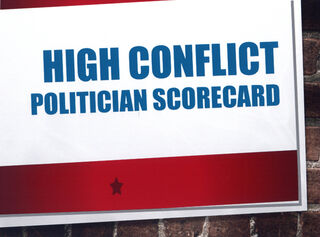Narcissism
High-Conflict Politician Scorecard
High-conflict politicians can cause harm and havoc. Look for the warning signs.
Posted October 31, 2020
Over the past few years, politicians with high-conflict personalities have been getting elected at all levels of government worldwide and then turning out to be huge mistakes. But there are warning signs if you know to look for them.
Some have been forced from office within the first year or two of their terms; others have been voted out in huge defeats in the next election; and a few around the world have taken over their governments as authoritarian rulers.

In 2012, Dr. Donald Saposnek and I wrote a book titled Splitting America, with an eye on the direction the United States was headed (yes, that was four years before 2016). We were concerned that high-conflict politicians and big money were pouring into our elections, without people being aware of the dangers of their personalities—unrelated to their political views (they often opportunistically choose the far right or far left of the political spectrum). In the back of the book (Appendix A), we developed a High Conflict Politician Scorecard. It is even more relevant today than it was then.
Useful in Any Election
This scorecard can be used in looking at any election, from the lowest levels of city and state government to the highest federal levels. This is not a research-based instrument but rather suggested for your own subjective use in thinking about candidates at all levels. As we said about the scorecard in 2012: “To a great extent, high-conflict behavior is in the eye of the beholder.”1
The idea is to draw your own conclusions by considering eight factors related to high-conflict personalities, with a range of 0 to 8 for each. This is not a tested instrument, but rather a suggestion for your own consideration to help you think ahead about these potential patterns of behavior. In many elections, you may believe that both candidates have some of these characteristics, so that you may decide to vote for the candidate with the least—the lowest score on the scorecard. Here’s a brief explanation of each warning sign:
Personal Attacks: People with high-conflict personalities are preoccupied with their targets of blame, and unable to see their own part in problems. While this may give some secret pleasure when your opponents are attacked by a high-conflict politician, it is a warning sign of someone who does not restrain themself nor focus on issues. It’s a personal attack when it's about morals, intelligence, looks, etc. This says nothing about the issues, one’s policy objectives, nor skills at solving problems. While one could argue that all politicians do this to some extent, high-conflict politicians do this much more than others and we should elect those that do it the least. In short, the more one attacks others the less capacity that person has for reflecting on and taking responsibility for their own behavior.
Score (circle one for the candidate you are looking at): 0 1 2 3 4 5 6 7 8
Crisis Emotions: People with high-conflict personalities are frequently feeling crisis emotions as an over-reaction to ordinary events. To others, these emotions can easily be misinterpreted as about the seriousness of the situation, rather than about the person’s own personality. Some politicians know they are exaggerating while others just can’t help themselves. In either case, this is undesirable and interferes with rational problem-solving.
Score: 0 1 2 3 4 5 6 7 8
All-Or-Nothing Solutions: This is another common problem of those with high-conflict personalities: they can’t deal with the gray areas and nuances of things. When you hear a lot of extreme thinking and solutions, it is an important warning sign of lack of problem-solving skills.
Score: 0 1 2 3 4 5 6 7 8
Self-Absorbed: This is an obvious narcissistic trait, but not always easy to see until you hear a lot of speeches or hear about the candidate from others who know him or her. Keep in mind that many (perhaps a majority) of politicians truly want to serve their communities, states, and nations and consider politics a professional calling just like other occupations. Politicians with extreme narcissistic traits may only be in it for themselves and their political views may swing widely in line with their personal interests, not their constituents. This has become a bigger concern over the last few years, so keep your eyes open. Also, see my book Why We Elect Narcissists and Sociopaths—And How We Can Stop!
Score: 0 1 2 3 4 5 6 7 8
Lacks Empathy: This is another common narcissistic trait, but again may not be obvious from the words the politician uses. In many cases, it is their actions, policies and history that show whether they have empathy or not for others.
Score: 0 1 2 3 4 5 6 7 8
Misjudges Others: This is a surprising trait of high-conflict politicians in that they are naïve about the behavior and deceptions of other high-conflict politicians. If they believe they are superior to others, they may be easily fooled or conned by those who know how to seduce them with flattery. Many are surprised by this warning sign, but it is an important one for constituents to consider.
Score: 0 1 2 3 4 5 6 7 8
Sees Self as a Big Hero: This is another common trait for those high-conflict politicians who are high on narcissism. The big problem with this is that they need to create crises and fabricate villains in order for them to be seen as a hero. Since high-conflict politicians usually lack problem-solving skills, they have to create a narrative of crises and villains to get elected as a hero. Then when real crises come along, they don’t know what to do and resort to distraction by creating other real or imagined crises and villains instead.
Score: 0 1 2 3 4 5 6 7 8
Doesn't Play Well With Others: Since high-conflict politicians see themselves as big heroes, they usually don’t like working as a team or delegating responsibilities to experienced people. In fact, this is one of the best ways to tell if you are dealing with merely an image of competence or a real competent politician. If they came up through the ranks of political organizations, then they may have some real skills. If they arrived on the scene as a hero without any real political background, yet they intend to ignore everyone else and go it alone, it is unlikely that they will be able to work with others to actually get things done.
Score: 0 1 2 3 4 5 6 7 8
Remember, the candidate with the lower score would appear less likely to have a high-conflict personality. Best wishes in considering candidates and making your decisions. This scorecard may be relevant for years to come.
References
1. Bill Eddy and Donald Saposnek, Splitting America: How Politicians, Super PACs and the News Media Mirror High Conflict Divorce (Scottsdale, AZ: High Conflict Institute Press, 2012), 145.




